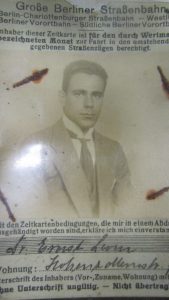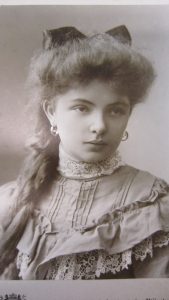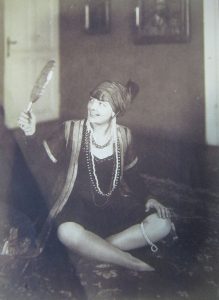As he wrote in later life, Ernst Levin believed that emigration saved his marriage, and that he and his wife had “Hitler to thank for keeping the family together”. Ernst’s marriage to Anicuta Belau in 1917 was undoubtedly a strong match, but inevitably the two forceful characters frequently clashed and the relationship was rocky, with a period of separation prior to 1936, despite their young daughter Annekathrin. Correspondence gives an insight into the course of the couple’s lives.
Ernst Levin was born in 1887 in Berlin to Willy and Natalie Levin. He studied medicine and went on to become a prominent neurologist, marrying Anicuta Belau in 1917, whilst serving in the First World War. The pair settled in Munich where they moved in artistic, bohemian circles, becoming friends with the painter Max Unold whom Ernst had met as a youth in 1906. After a spell of separation, Ernst and Anicuta emigrated to Edinburgh together with their daughter Annekathrin in 1936.


Anicuta Belau, born 1886 in Bucharest, Romania, also came from a wealthy family. She studied art in Utrecht, and the collection contains some of her sketchbooks and loose drawings. Anicuta had a taste for fashion and many photographs of her in exotic costume dress exist, probably stemming from the couple’s ‘wild’ years within the art scene of 1930s Munich.


***************************
Letter from Willy Levin to Ernst, his son, on his marriage to Anicuta in 1917:
The Levins were a prominent and wealthy Jewish family in Berlin, Ernst’s father Willy being a businessman with several confectionery factories and a patron of the arts in his free time. You can read more about the Levins’ lavish lifestyle in the post dedicated to Ernst’s family. Romanian-born Anicuta is described as ‘Aryan and Catholic’ by Elias Auerbach, who refused Ernst permission to emigrate to Palestine on this basis. There may have been tension amongst the Levin family at the idea of Ernst marrying out of the Jewish community, as indicated by the below letter.
12th October 1917
“I am very sad, that I haven’t heard anything from you since the wedding. Instead of being especially grateful to me over my approval of your marriage, I have the bitter feeling that now, after having reached your goal, you are playing the victim. Apparently you also wrote to Walter Kantorowicz on this matter, complaining bitterly about our cold treatment of your wife. But that was our agreement, son. I gave you my consent and promised you to create as good a relationship as possible between our family and your wife. It is understandable that this can’t happen overnight. Your wife appears just as strange to us, completely foreign outside and in, as we do to her. Your mother was very kind to her in Munich, we ate together … I think this should surely be enough for the moment. I also don’t think your wife complains about us, or has any reason to.”


****************************
Feldpost Letters
Ernst Levin served as a medic during the First World War, later winning a medal of honour for his bravery at the battle of the Somme. He clearly rallied and worked efficiently under pressure and in unpleasant war-time conditions, as evidenced by his later enthusiastic contribution to the medical unit of his internment camp on the Isle of Man, 1940.
During the course of the war from 1914-1918, Ernst and Anicuta kept up regular correspondence through the war-time postal service or ‘Feldpost’. The script is dated to the point of illegibility, but examples are shown below:


*********************************
Letter from Willy Levin in Bad Kissingen to Anicuta during WW1, whilst Ernst served at the front
22nd May 1918
“I have heard from Ernst recently, but am not very happy over his unhappy tone. What he has to endure must be endured by all those in the field and even us at home are not exactly lying on a bed of roses. I wrote to mother [Natalie], that if somehow possible she should send Ernst some honey etc., which might improve his mood. There isn’t any chocolate anymore, and I assume you will send him something nice too. But don’t spend too much … I’ve heard from Ernst that you want to go on a health retreat … I would like to hear from you in Aibling [spa town]. I hear that in Munich, one can buy all kinds of things. Could you also please watch to make sure you aren’t as undernourished as when I last saw you – with this you are only hurting yourself”

*****************************
Letter from Anicuta’s friend, writer Reinhard Koester (alias Karl Kinndt) with whom Anicuta had corresponded with regularly since the early 1910s, advising her on her separation:
Ernst and Anicuta underwent a lengthy period of separation prior to their emigration to the United Kingdom, as confirmed by Ernst’s regretful reflections on the impact this had in later life. He claims in a letter to a friend that “Hitler kept the family together”, and that the separation left an “indelible mark” on Annekathrin and Anicuta. Below is a letter from a friend in Munich advising Anicuta on how she should behave in her present circumstance.

26th March 1932:
“I think it’s very sensible that you have rented your own small apartment, assuming that Levin has officially given his consent. If you can then just live for your child and stay in Munich after all, instead of being alone in Dachau, then hopefully you will become calmer. I think, the calmer you are and the less you fight against him and her [the third party], the more you leave them alone, the more likely it is that he will tire of her and truly return to you, if that is even still possible. If he can sense that you are willing to let him have his woman but in return want the child, he might come to his senses … and the more unrestrained those two can be together, the more they will fight with each other. You just have to tell yourself one thing every day: if you ever get back together, then everything that has happened has to be forgotten and erased. After all, you share some of the blame! … just be happy, that your Annekathrin has turned out well … despite having lived through all this conflict at such an early age. What’s the use of a ‘nice upbringing’ nowadays anyway? Then afterwards the disappointment is just far greater. Make her a girl who will go into life with clear and open eyes, knowing that she has to shape her own path. Then maybe she might later be happy, that she didn’t have such a ‘nice upbringing’, when life gives her more than she expected. It was the other way round for you – and for me too”


********************************
Letter advising his younger friend
In a letter to a friend, Ernst expresses regret over his and Anicuta’s lengthy separation, particularly in regards to the impact it had on his wife and child in the following years.
6th May 1956
“I am today writing to you rather reluctantly. It was unavoidable that I learned from Annekathrin about your recent – and I do hope – transient separation. It was sad news.
You will understand that I am diffident about writing as I do not wish to give you the impression that I want to intrude in such an utterly private and intimate matter unasked.
… You probably know – or have guessed – that my wife and I have gone to the ordeal of a long separation prior to our emigration when Annekathrin was about [child of recipient’s] own age. We have to thank Hitler for keeping the family together, but still, this separation has left a mark on my wife and on Annekathrin indelibly, and I myself am still blaming myself for what I did especially to Annekathrin during the most impressionable years of her childhood when she had no father and no family home.
Please … don’t misunderstand me. I say all these things only to make you feel that I understand and that I am no stranger to your problems. Believe me, I have no wish to intrude or interfere, but if you feel I could be of any help to you and [recpient’s wife], by listening, without judging or taking sides, I will try as hard as I can. – If you can absent yourself from your work for a few days you can live with me in the flat at any time.
With kind regards,
Your old friend”
*******************************
Hand-written note in shaky script by Ernst towards the end of his life
Ernst and Anicuta’s marriage, though clearly an affectionate and mutually supportive one, had its ups and downs. Below is a note scrawled by Ernst on the subject of marriage and ‘Bohemian women’, perhaps referring to his wife Anicuta.
“I often wished to marry an English woman of English education, and for that I would risk occasional indigestion. I do not wish to marry a house-wife, as Bohemian women are. Also I will not hide from you that it is good to have money, as our exchange has lowered, I think that physical affection is not a basis for marriage.”